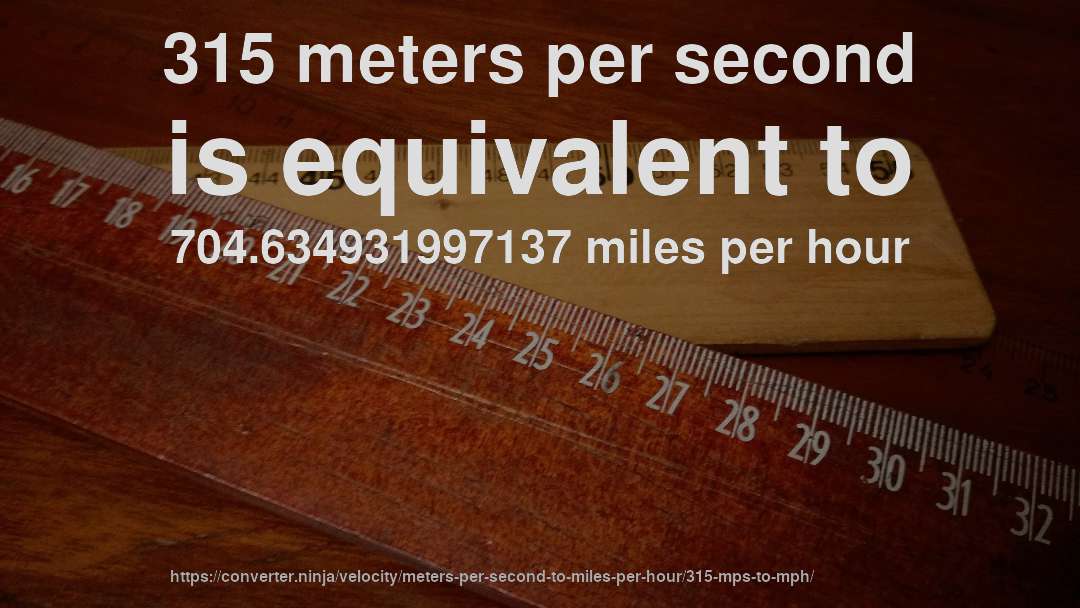
This error was later rectified by Laplace. The discrepancy is due primarily to neglecting the (then unknown) effect of rapidly-fluctuating temperature in a sound wave (in modern terms, sound wave compression and expansion of air is an adiabatic process, not an isothermal process). Sir Isaac Newton's 1687 Principia includes a computation of the speed of sound in air as 979 feet per second (298 m/s). 7 Effect of frequency and gas composition.6.1 Speed of sound in ideal gases and air.5 Altitude variation and implications for atmospheric acoustics.4 Dependence on the properties of the medium.Objects moving at speeds greater than the speed of sound ( Mach 1) are said to be traveling at supersonic speeds. The ratio of the speed of an object to the speed of sound (in the same medium) is called the object's Mach number. In fluid dynamics, the speed of sound in a fluid medium (gas or liquid) is used as a relative measure for the speed of an object moving through the medium. The speed of shear waves is determined only by the solid material's shear modulus and density. The speed of compression waves in solids is determined by the medium's compressibility, shear modulus and density.


Shear waves in solids usually travel at different speeds than compression waves, as exhibited in seismology. Sound waves in solids are composed of compression waves (just as in gases and liquids), and a different type of sound wave called a shear wave, which occurs only in solids. In an exceptionally stiff material such as diamond, sound travels at 12,000 metres per second (39,000 ft/s), - about 35 times its speed in air and about the fastest it can travel under normal conditions. For example, while sound travels at 343 m/s in air, it travels at 1,481 m/s in water (almost 4.3 times as fast) and at 5,120 m/s in iron (almost 15 times as fast). However, the speed of sound varies from substance to substance: typically, sound travels most slowly in gases, faster in liquids, and fastest in solids.

In colloquial speech, speed of sound refers to the speed of sound waves in air. The speed has a weak dependence on frequency and pressure in ordinary air, deviating slightly from ideal behavior. The speed of sound in an ideal gas depends only on its temperature and composition. It depends strongly on temperature as well as the medium through which a sound wave is propagating. At 20 ☌ (68 ☏), the speed of sound in air is about 343 metres per second (1,125 ft/s 1,235 km/h 767 mph 667 kn), or one kilometre in 2.91 s or one mile in 4.69 s.
METERS PERSECOND TO MPH FULL
Symbols, abbreviations, or full names for units of length,Īrea, mass, pressure, and other types.The speed of sound is the distance travelled per unit of time by a sound wave as it propagates through an elastic medium.

You can find metric conversion tables for SI units, as wellĪs English units, currency, and other data. It is commonly abbreviated in everyday use in the United States, the United Kingdom, and elsewhere to mph or MPH, although mi/h is sometimes used in technical publications.Ĭonversion calculator for all types of measurement units. Miles per hour is a unit of speed, expressing the number of international miles covered per hour. One metre per second is roughly the speed of an average person walking. spelling: meter per second) is an SI derived unit of both speed (scalar) and velocity (vector quantity which specifies both magnitude and a specific direction), defined by distance in metres divided by time in seconds. Mph to m/s, or enter any two units below: Enter two units to convert From: You can do the reverse unit conversion from


 0 kommentar(er)
0 kommentar(er)
